Wealth Inequality – from Daniel Blake to Robo Debt
April 28th, 2017 | Published in Economic (in)justice
I recently watched I, Daniel Blake and The Founder in a single viewing, immersed in the story of wealth inequality unfolding between their extremes.
I, Daniel Blake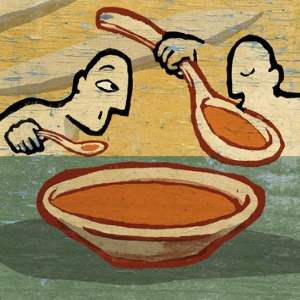 provides a graphic tour of life on social security benefits in neoliberal Britain.
provides a graphic tour of life on social security benefits in neoliberal Britain.
The Founder tells the story of smooth talkin’ travelling salesman, Ray Kroc, who built the multi-billion dollar McDonald’s fast food franchise, trampling his way up the ‘ladder of success’.
These films, closer to fact than politicians care to admit, reflect the lived reality of punitive welfare systems, on the one hand, and greedy plutocrats on the other. They have close parallels in current Australian society.
I, Daniel Blake
Daniel (of I, Daniel Blake) has heart disease. He has been declared unfit for work as a carpenter. He loses his sickness benefits, having ‘failed’ an assessment. His only remaining option is to apply for the Jobseeker’s Allowance (JSA) while waiting to appeal the decision on his sickness benefits.
He is directed to complete forms online, but Daniel has never used a computer. “Give me a block of land and I’ll build you a house,” he says, “but I’ve never been near a computer.” That’s a big hurdle for a man in his sixties, and just one of an endless series of soul-destroying obstacles. At least he was able to overcome that one with help from friends.
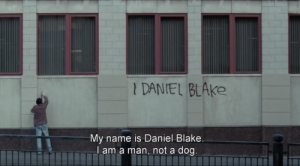 Daniel completes the compulsory curriculum vitae training course and distributes his CV as instructed. He’s called for an interview (surprisingly, given the shortage of jobs) and has to explain to the potential employer that he’s medically unfit for work. A predictable conversation follows. The employer is annoyed at having his time wasted. He blames Daniel, not understand the absurdity of a system that demands applications for jobs that are out of the question for health reasons.
Daniel completes the compulsory curriculum vitae training course and distributes his CV as instructed. He’s called for an interview (surprisingly, given the shortage of jobs) and has to explain to the potential employer that he’s medically unfit for work. A predictable conversation follows. The employer is annoyed at having his time wasted. He blames Daniel, not understand the absurdity of a system that demands applications for jobs that are out of the question for health reasons.
Daniel fails to satisfy the requirements of proof of his job searching , and so fails to qualify for the JSA.
He sells his possessions, lives without heating in wintry Britain, and rejects food bank assistance. He becomes increasingly unwell.
Over the journey he befriends Katie, a single mother of two young children, Daisy and Dan. Katie doesn’t eat so her 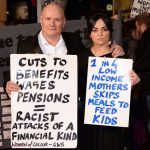 children can. She’s mortified when she’s sprung scooping food directly from a can at the food bank. She gets caught shoplifting sanitary products from the supermarket, and prostitutes herself to get money for her kids.
children can. She’s mortified when she’s sprung scooping food directly from a can at the food bank. She gets caught shoplifting sanitary products from the supermarket, and prostitutes herself to get money for her kids.
Katie goes along as support person when Daniel’s appeal is finally called. Daniel collapses in the men’s room while they’re waiting for the hearing. Katie is devastated.
I, Daniel Blake starkly illustrates the illogic of the algorithmic rules, and the punitive, dispiriting procedures that people are put through looking for needles in haystacks, or jobs they can’t do for health or logistic reasons.
Workers in the system come across as robotic. “There are rules and we all need to follow them,” says one bouncer-style security officer.
The trouble is the rules don’t make sense. They have a Kafkaesque quality that should be the stuff of satire, not the reality of people’s lives.
One staff member, Anne, does try to be helpful but was called out for her pains. The manager cautions her for noncompliance.
Jason Di Rosso sums up I, Daniel Blake “as a moving indictment of a system that does the opposite of what it claims: undermining instead of empowering the people it’s supposed to help.”
The system is killing people, but not their pride.
“I’m not a client, customer, or service user,” says Daniel. “I’m a man.” He’s a decent man, who supports others where he can, and creates his own one-man protest that draws crowds and applause.
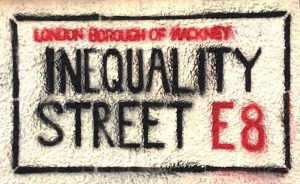
The Founder
The Founder’s main character, Ray Kroc, could more aptly be described as the bounder. He ‘rose’ from being a travelling salesman of milkshake machines in the 1950s and jumped on the ‘ladder of success’. He epitomises the ‘self-made man’ of the American Dream mid-twentieth century style.
His wife endures years of get-rich schemes, brash enthusiasms, absences, drinking, and the mortgaging of her home without her knowledge. She then finds herself replaced by the trophy wife once Ray ‘makes good’.
Ray becomes smoother, oilier, and more blatantly ruthless as his empire grows.
“Persistence,” he says. That’s what the American dream is all about. “Persistence. Put your arms around it. Jump on that ladder of success.” You too can achieve the pinnacle.
He praises himself and valorises persistence in a speech directly plagiarised from the motivational tape he used to play in seedy motel rooms during his days on the road.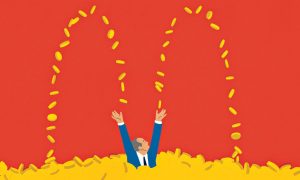
He was certainly persistent in his professional leeching of the McDonald brothers. They ran the restaurant that provided the template for the the original McDonald’s hamburger, and formed an agreement with Kroc to build the franchise.
Kroc increasingly defied the agreement.
He renamed his company The McDonald’s Corporation, demanding to be released from his contract, and to buy the brothers out. He offered a blank check. The brothers agreed to a $2.7 million lump sum and a 1% annual royalty. But, when the time came to finalise the agreement, Ray refused to include the royalty and offered a handshake agreement instead.
One of the brothers asks Ray why he had to take over their business, when he could have stolen their idea and recreated it. Ray acknowledges that the true value of McDonald’s is the name itself.
McDonald’s, apparently, expresses all the attributes of Americana. It’s the New American Church, open seven days a week, symbolising family and nationhood. The ubiquitous golden arches replace steeples and flags.
McDonald’s measures annual revenue in billions per year. But, the McDonald brothers were never paid their royalties.
“Business is war,” says Ray.
This factional film, based on the history of the McDonald’s franchise, strikes me as a forerunner of The Wolf of Wall Street. Both films portray the corruption, fraud, decadence and extravaganzas of wealth that can arise when the American dream is interpreted as a licence for greed. Both films represent the endgame, at the other extreme to I, Daniel Blake, of decades of neoliberalism, across continents.
As Rutger Bregman puts it, “wealth isn’t created at the top. It is merely devoured there” – despite trickle-down rhetoric.
The lived reality of wealth inequality
I watch these films, and look at our news reports in Australia, and the parallels are striking. Politicians and other apologists will point to differences, but their rationalisations are thin.
Recurrent reports tell an Australian story of those at the struggling end of wealth inequality:
- Harassed welfare recipients, pressured to chase jobs that won’t go around; unemployed people working for the
 dole in a scheme described as a “demonstrable failure“; cashless welfare cards that are yet another means of villifying and demeaning people on benefits; cuts to pensions; and cuts to penalty rates.
dole in a scheme described as a “demonstrable failure“; cashless welfare cards that are yet another means of villifying and demeaning people on benefits; cuts to pensions; and cuts to penalty rates.
Another major segment of our media reflects factors that contribute to escalating inequality:
- Tax cuts to big business; inflated CEO salaries; $900 million dollars of public money for the Adani coal mine plus an unlimited 60-year water licence; unscrupulous overspending of ‘entitlements’ by politicians; cuts to community services; and a housing policy involving negative gearing and capital gains tax exemptions that put home ownership out of range for nearly 50% of 35 to 44 year-olds, and 70% of 25 to 34 year-olds.
Framing wealth inequality in Australia
I could go on and on labouring each of these points, and more, but there seems no need. Any of the above topics yields a wealth of articles and opinion pieces if plugged into a search engine.
Rather, I would again like to frame the discussion with a couple of recent examples.
Centrelink robo debt recovery program
The Australian social security system has been under scrutiny by the Ombudsman because of its automated (robo) debt recovery program, which has issued thousands of incorrectly calculated debt notices. These have caused immeasurable stress to people already in difficult circumstances. But, politicians have persisted in asserting full confidence in the program, the system, the complaints process, and the token changes made.

The program, officially named Project NEIDM (Non Employment Income Data Matching) “is frankly a flaming train-wreck,” writes Asher Wolf, “with up to 90% of Centrelink debts allegedly incorrectly calculated. It’s a system of false debt generation via algorithm, a government perpetrated fraud against the Australian people.”
Wolf summarises stories from the media including:
- People missing limbs or dying of cancer whose Centrelink claims are rejected.
- First Nations people in remote communities being placed in debt because they can’t get to an office or through on the phone to report their details.
- People with intellectual disabilities being menaced by debt collectors.
- Single parents being harassed because their ex-partners haven’t lodged tax returns.
The worst moments, though, says Wolf, are nonetheless hidden.
Poverty and fear kill people.
Depression, anxiety and trauma kill people.
The Australian government and its automated data-matching programs are killing people.
Salary scamming by employers
At the other end of the continuum, George Calombaris has recently been in the news for underpaying staff in his restaurant empire.
I don’t particularly want to single Calombaris out. He wouldn’t be the worst example of exploiting workers at the altar of profit. Think of some of the franchises including 7-Eleven, for example. And, Ged Kearney has described underpayment in the hospitality and retail sectors as a business model for many employers.
But, Calombaris’ parallel enthusiasm for cutting penalty rates makes his claims of devastation over his ‘blunder’, as he puts it, in relation to wages, rather less than convincing.
He has also tried to soften the story by claiming that some workers were overpaid and that he’s not asking for money back from them. But, insiders’ reports explain that the supposedly overpaid workers were salaried staff who were working many hours of overtime for which they were not paid at all. Overpayment of their base rate would not come near to compensating the unpaid hours of overtime.
Conclusion
I know which story I’m more inclined to believe even though, in theory, I should possibly be giving Calombaris the benefit of the doubt.
But, giving Calombaris and his ilk the benefit of the doubt does nothing to challenge wealth inequality. It’s like being sympathetic to The Founder or The Wolf of Wall Street. I find it hard to imagine why anyone would see these characters as appealing, let alone justified in their ego-driven pursuit of power and wealth that leads to the situation in which 8 people worldwide own more wealth than 50% of the global population.
Can we not establish a space between I, Daniel Blake and The Founder in which every person across the planet has their basic needs met, inequality is minimised, AND we effectively address climate change? I suppose such a question will be written off by many as naive, lefty idealism, but to me it seems the only defensible position!

NOTE: If you like this post, you might also be interested in
Slow clap for part-time work
This is what it’s like to need income support
When Newstart means NoStart
Scroll down for comments
First-time comments have to be moderated. I try to complete that process, and respond, within 24 hours.
Do check back.
Social justice is for everyone (previously 2020social justice) is also on Facebook (click here)
Twitter (click here)
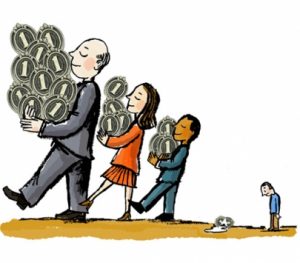 dole in a scheme described as a “
dole in a scheme described as a “


Joan,
Fancy coming across you on Rob Ditterich’s blog about fiddles and boats. Happy serendipity. I’ve added your pieces to the “blog roll” on the side bar of my blog about fiddling with boats. That blog list is something I keep mostly out of my own interest, but also hope others find it thought provoking.
Here in the US, we’ve been led to believe the economic and social situation in Australia is more sound than ours, but your writing tells a much different story.
I am one of those caught in the absurdity of being disabled enough and not able hold a job, yet unqualified under the rules to receive any assistance. I am also getting older and physically worse every day. Old age holds questionable promise for me and many others. Ironically, the “American Dream” promised us a much different story.
I believe there is a way out. We are many. We have the ability to communicate above the din. I’m happy to have found your voice.
Michael
Hi Michael,
It’s likewise fascinating to find myself in the territory of music and boats – as a result of a blogpost on wealth inequality(!) – but life on the internet is full of surprises, and some of them can be pleasant ones.
I’m sorry to hear of your personal situation, and particularly appreciate your optimism under the circumstances. Whatever the end result, I do know we can’t give up trying to “communicate above the din” and unlikely connections such as ours, enabled by the net, are a small example of the possibilities for amplification.
No wonder politicians want to control and censor the net. Theresa May is currently pushing to do so in the UK (in the name of preventing terrorism) and I have no doubt that other governments will follow the lead as soon as possible http://www.mintpressnews.com/theresa-may-wants-new-internet-monitored-government/228154/
We’ve been conditioned (particularly since 9/11) to yield freedoms and privacy in return for the promise of ‘security’ and, in Australia at least, there seems little concern on the part of many about the dangers of such a trade-off in terms of increasing political control. A common response I encounter when I post on social media about such issues is the one about “if you have nothing to hide, you have nothing to worry about”.